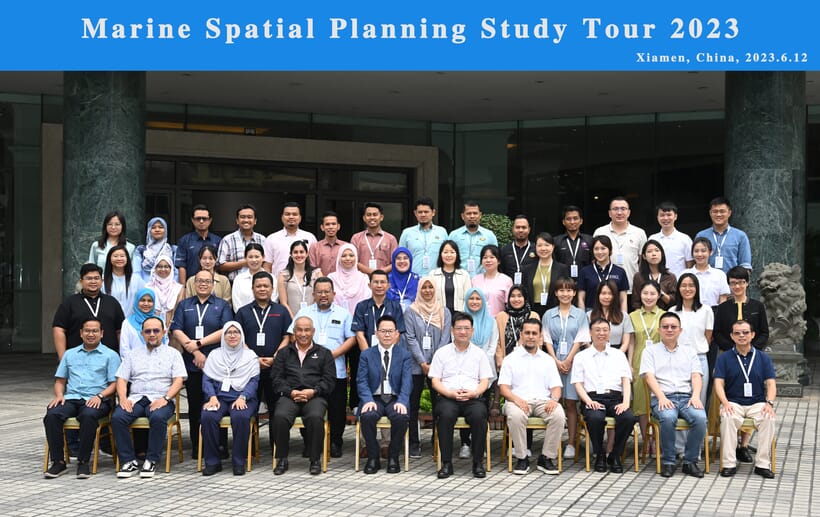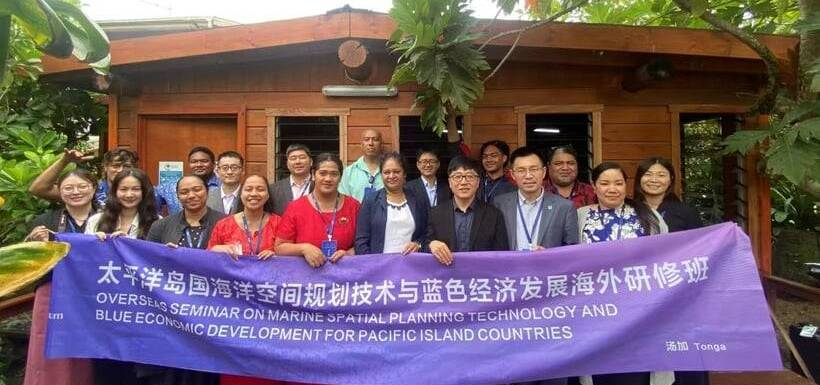News
On 11 June, 2023, “Marine Spatial Planning Study Tour” hosted by the China Oceanic Development Foundation (CODF), Fujian Institute for Sustainable Oceans (Xiamen University) (FISO) and the project“Coastal Zones Under Intensifying Human Activities and Changing Climate: A Regional Programme Integrating Science, Management and Society (Coastal-SOS)” was officially launched in Xiamen Hotel. Pan Xinchun, Vice President and Secretary-General of CODF, Jiang Yunbao, Vice President of Xiamen University, Rosli Bin Latif, Mayor of Kuala Terengganu, Xue Xiongzhi, Dean of FISO and others attended the opening ceremony. The opening ceremony was presided over by Dr. Li Yanting, President Assistant of FISO, with opening speeches by Pan Xin Chun and Professor Mohd Fadzil Bin Mohd Akhir, Director of the Institute of Marine and Environmental Studies, Universiti Malaysia Terengganu, and welcoming remarks by Jiang Yunbao.

A group photo of all the members of the tour
On behalf of the organizers, Pan Xinchun first extended warm congratulations on the smooth opening of the study tour, warmly welcomed the leaders, teachers, students and guests who attended the opening ceremony of the study tour, and expressed heartfelt thanks to the team led by Dean Xue Xiongzhi for their hard work in arranging this study tour.
He said, the ocean is our home, providing us with air, food, resources and energy, regulating climate and weather, and sustaining the prosperity and health of communities around the world. The oceans are also home to life, with the largest population of biodiversity on Earth. The ocean has made great contributions to the development and progress of human society when it is exploited and utilized by human beings. At the same time, we should also see that climate change, caused by the cumulative effect of human overexploitation, is heating up the planet, disrupting weather patterns and ocean currents, and altering marine ecosystems and the species that live in them. Marine biodiversity is under threat from overfishing, overexploitation and ocean acidification, fish stocks are being depleted, and chemicals, plastics and human wastes are polluting coastal waters. The continuous occupation of coastal wetlands has resulted in a large reduction of mangroves, coral reefs, seagrass beds, and salt marshes, and a sharp decline in carbon sink capacity.
He stated, the serious marine problems caused by human overexploitation and utilization of the ocean have aroused great attention from the United Nations and governments. The Chinese government has pointed out that, in the face of maritime problems, if people continues to use traditional ways of production and life, the ocean will not be able to withstand and development will be unsustainable. Only a green, low-carbon, intelligent, efficient and safe way of production and life can ensure the balance between marine protection and development, and promote the sustainable development of human economy and society. In today's world of ever-changing science and technology, the full use of high-tech, artificial intelligence, big data, etc., can fully achieve green, low-carbon, intelligent, efficient and safe development in marine protection and development. Therefore, in terms of the way the oceans are exploited, it is both a trend and an inevitability to replace old growth drivers with new ones, that is, to replace old technologies, old materials and old business formats with new ones, and move toward green, low-carbon, intelligent, efficient and safe development.
He stressed, the Chinese government attaches great importance to marine protection and has introduced a series of policies and measures to strengthen marine protection, such as, not approving new reclamation projects except for major national projects; strictly protecting natural shorelines and coastal wetlands and including them in the scope of ecological redline management; prohibiting the discharge of substandard pollutants into the sea; carrying out marine ecological restoration projects; promote the development of the blue economy; and encourage the development of low-carbon, zero-emission, saving, intelligent, efficient, safe and promising marine emerging industries. The implementation of these major policies and measures has contributed to the rapid improvement of China's marine ecological environment and the increasing happiness and sense of gain of the people, which has been highly appreciated by the international community. Malaysia has made positive achievements in marine protection and the development of the blue economy, and we can exchange and learn from each other, support each other and move forward together.
He introduced, as a social organization dedicated to marine protection, ocean governance, blue economy development and the construction of the "Maritime Silk Road", CODF has carried out a series of activities and achieved good results. CODF is implementing “Ten Actions”, among which the international actions, such as, “Maritime Silk Road Blue Economy Action to boost the high-quality development of the ‘Belt and Road’”, “Maritime Silk Road Coastal Development Assessment Action to promote the sustainable development of the coastal zone”, “Ocean Decade Action to advance the scientific plan for comprehensive ocean management”, “Blue Partnership Action to promote further bilateral cooperation”, “International Marine Exchanges and Dialogues Action to unite the forces of peaceful development of different civilizations”, and “High-quality Development of Marine Economy Action to attract investment to developing countries”, and gathers hundreds of institutions from many countries of different civilizations to participate in the process. In addition, the two actions of “Maritime Silk Road Blue Economy Action to boost the high-quality development of the ‘Belt and Road’” and “Maritime Silk Road Coastal Development Assessment Action to promote the sustainable development of the coastal zone” are carrying out practical cooperation with relevant institutions in Malaysia and other countries.
He stressed, protecting, exploring and developing the ocean is the eternal theme and task of human beings. It hopes that this study tour can increase mutual understanding, enhance mutual friendship and strengthen mutual exchanges, lay the foundation for deeper, more extensive, higher quality and more pragmatic cooperation in the marine field in the future, and jointly make positive contributions to the protection, exploration and development of the ocean.
Mohd Fadzil thanked CODF and Xiamen University for hosting the study tour. He said that he was deeply impressed by China's rapid development and hoped that the two sides could continue to expand the cooperation in more areas. In addition, the Malaysia Marine Spatial Planning cooperation project supported by CODF as well as the cooperation between FISO and the Institute of Marine and Environmental Studies, Universiti Malaysia Terengganu have achieved phased results. It is hoped that the three parties can continue their long-term cooperation in the field of marine sustainable development and promote the high-quality development of Malaysia's marine economy.
Jiang Yunbao, on behalf of Xiamen University, extended a warm welcome to 29 government officials, experts and scholars from Malaysia. He pointed out that the year of 2023 marks the 10th anniversary of “the Belt and Road Initiative” proposed by the president Xi Jinping and also the 20th anniversary of China's accession to the Treaty of Amity and Cooperation in Southeast Asia, and China-Asean cooperation faces new opportunities. Since the establishment of diplomatic ties in 1974, China and Malaysia have continuously expanded and deepened bilateral relations, which has brought many benefits to both sides and played an important role in promoting the prosperity and progress of the two countries. Through the alignment of “the Belt and Road Initiative”, the two sides will continue to expand cooperation in the fields of sustainable marine development, marine science and technology, and higher education of marine disciplines.
With the theme of "Marine Spatial Planning for Coastal Sustainable Development", this one-week study tour is one of the important contents of the international cooperation project "Marine Spatial Planning in Malaysia" sponsored by CODF. After the opening ceremony, Pan Xinchun taught the first lesson entitled " Marine spatial planning - Guarantee of Marine Protection and Utilization" for the participants. He introduced the history of China's Marine Functional Zoning (incorporated into territorial spatial planning in 2018) from research, exploration to practice. He pointed out that after 45 years of development, China's Marine Functional Zoning has established a relatively complete theoretical and technical system. China's Marine Functional Zoning, as the general framework of ocean protection, ocean utilization, land and sea coordination, and marine sustainable development, has vigorously promoted the construction of marine ecological environment protection and technology system, sea area use management and technology system, marine economic development and technology system, and modern marine industry and technology system. The National Territorial Spatial Planning has been issued, which highlights the strengthening of ecological priority, environmental protection, conservation and intensive, land and sea coordination, disaster prevention and reduction, people-oriented, harmony, beautiful oceans and sustainable development in sea areas space. He then answered the questions raised by the students. In addition to participating in the seminar, the participants will also discuss the international cooperation project of "Marine Spatial Planning in Malaysia ", the project of “Coastal Sustainable Development Capability Index along Maritime Silk Road countries”, and visit the main demonstration site of Integrated Coastal Management (ICM) in Xiamen.
Wang Min, Vice Secretary-General and Director of the Office (Finance Office) of CODF; Li Yan, Deputy Director of the Maritime Silk Road Department of CODF; Liu Zhiyu, Deputy Dean of FISO/College of Ocean and Earth; Lin Xiaoyan, Executive Director of Project Design and Promotion Department of FISO; Luo Yawei, Director of Coastal-SOS Project Office; Wan Marahakim Bin Wan Salleh, Legal Director of Kuala Terengganu City Hall, Tpr Eddy Bin Hashim, Director of Kuala Terengganu Town Planning, Ts.Muhammed Shawal Sufivan Bin Mat Amin, Director of Kuala Terengganu Building Management, Effi Helmy Bin Ariffin, Deputy Dean of the Institute of Marine and Environmental Studies, Universiti Malaysia Terengganu; Wan lzatul Asma Binti Wan Talaat, Head of the Centre for Ocean Governance, Universiti Malaysia Terengganu; Safura Binti Mad Juhari, Director of Terengganu Water Resources Committee; Teng Xin, head of the secretariat of Marine Spatial Planning Academy of CODF, Meng Xue, Zhao Qiwei and other members attended the opening ceremony of the study tour.

- Marine Spatial Planning Study Tour 2023 Officially Launched
- President Lv Bin Met with Her Royal Highness of Tonga Pilolevu Tuita in Beijing and Signed a Memorandum of Understanding on Cooperation
- Dialogue eyes key role of youth in RCEP region's growth
- Pan Xinchun Attends the 2022 China Ocean Action Roundtable and Introduces Ten Major Actions



 Home
Home  About Us
About Us  Our Programs
Our Programs  Cooperative Partner
Cooperative Partner